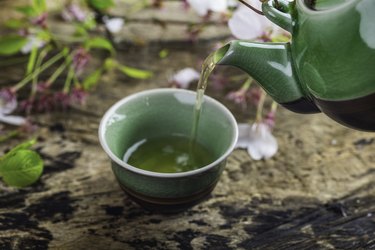
If you love a hot cup of brew with breakfast, you might consider swapping your morning joe for green tea.
Not your average herbal beverage, green tea, known for its abundance of antioxidants, has been popular in eastern countries such as Japan, Thailand and India for ages thanks to its plethora of health benefits. But the brew comes with its downsides, too.
Video of the Day
Video of the Day
The Health Benefits of Green Tea
From fighting cancer to improving brain function, green tea is associated with a gamut of good-for-you health advantages.
Green tea is a rich source of flavonoids — aka bioactive compounds found in plants — that can combat oxidative stress and relieve inflammation.
1. It's Tied to Reduced Rates of Heart Disease
Every year, more people die from cardiovascular diseases than from any other cause, according to the World Health Organization. In addition to eating healthy and exercising regularly, sipping on green tea might help reduce your risk of developing heart-related diseases.
That's because green tea is a rich source of flavonoids — aka bioactive compounds found in plants — that can combat oxidative stress, relieve inflammation and, as a result, help lower plaque buildup in your arteries, per Harvard Health Publishing.
Indeed, drinking green tea may protect you from developing harmful levels of LDL cholesterol, says Leslie Langevin, RD and author of The Anti-Inflammatory Kitchen Cookbook.
Green tea and its catechins are tied to improved blood pressure, and the effect may be greater in people with systolic blood pressure greater than or equal to 130 mm Hg, according to a September 2014 meta-analysis in the European Journal of Nutrition, which also suggests that green tea catechins may improve total and LDL cholesterol.
Drinking four cups per day is tied to reducing systolic blood pressure and preventing hypertension specifically in people with type 2 diabetes, according to a small December 2013 study in the Journal of Research in Medical Sciences.
What's more, research has shown that tea-drinking can decrease your chance of atherosclerotic cardiovascular disease (ASCVD), including coronary heart disease and stroke.
A January 2020 cohort study of Chinese adults in the European Journal of Preventive Cardiology observed that sipping regularly not only lessened the incidence of ASCVD (and ASCVD-related death), but all-cause mortality, too. And, compared to those who rarely drank tea, habitual tea drinkers were observed to live an average of 1.26 years longer.
And the flavanols in green tea are associated with a significantly lower systolic and diastolic blood pressure, which can be linked to better heart health, per an October 2020 study in Scientific Reports.
2. It's Linked to Lower Rates of Cancer
With its high antioxidant content, green tea has shown promising effects for fighting different types of cancer, Langevin says. In fact, one December 2018 systematic review and meta-analysis published in Nutrients found that green tea was associated with a lower probability of breast cancer, especially for breast cancer recurrence.
Some preliminary laboratory studies have even discovered that the catechin epigallocatechin-3-gallate (EGCG), a polyphenol found in green tea, can cause tumor cell death while another polyphenol, epigallocatechin (ECG), can halt leukemic cells from reproducing, according to Memorial Sloan Kettering Cancer Center.
While lab studies have linked EGCG and ECG with having anti-cancer properties, future studies, especially in humans, are needed to confirm these benefits.
3. Green Tea May Aid in Weight Loss
If you're trying to shed some pounds, adding green tea to your daily routine may help you win the battle of the bulge.
Not only can the caffeine in green tea temporarily boost your metabolic rate, but the compounds in the tea may also increase fatty acid breakdown, says Langevin. Case in point, the same 2013 study published in the Journal of Research in Medical Sciences also found that ingesting four cups of green tea per day decreased body weight and waist circumference.
Researchers theorize that EGCG, which has been shown to promote fat oxidation and calorie burn, may play an essential role in green tea's weight-control perks.
What's more, a May 2020 analysis of 26 randomized controlled trials published in Phytotherapy Research found that drinking green tea for longer than 12 weeks is linked to lower body weight and body mass index in people with obesity.
4. It Might Offer Brain Benefits
Sipping green tea may also help protect your brain and decrease your risk of neurodegenerative diseases, Langevin says.
Matter of fact, a September 2016 study in Age Aging found that drinking green tea was linked to a lower prevalence of cognitive impairment and Alzheimer's disease in older adults.
What's more, the bioactive components in green tea, such as polyphenols, theanine, caffeine and theaflavins, are associated with a reduced risk of and lower the morbidity of Parkinson's disease and Alzheimer's disease, per a February 2018 review in Molecules.
5. It's Tied to Lowering Blood Sugar
The brew may also aid in regulating blood sugar levels. A June 2013 meta-analysis in The American Journal of Clinical Nutrition showed that green tea significantly lowered blood sugar and may also reduce fasting insulin concentrations.
Subsequently, green tea may even be a useful tool in the fight against diabetes: Several clinical trials have found that green tea exhibited promising effects for the prevention and treatment of diabetes mellitus and its complications, per a June 2019 review in Antioxidants.
While green tea may not directly improve glucose control, this study suggests it can improve the action of insulin in the body, decrease inflammation and protect the body's insulin-producing cells — which may help reduce the risk of developing diabetes and its complications.
People Who Should Limit Caffeine

Despite its many health benefits, drinking too much green tea can be contraindicated for certain people. When in doubt, always consult your doctor or health care provider for recommendations before drinking green tea or using it in recipes.
People with heart problems: "Excessive caffeine intake is not recommended for those with tachycardia and heart arrhythmias," adds Langevin. Make sure to limit your intake to no more than 300 milligrams of caffeine a day — for reference, a cup of tea has around 35 to 55 milligrams, per the American College of Cardiology.
People with anemia: Due to its tannins (a type of polyphenol), green tea may decrease your ability to absorb iron, according to Langevin. Here's a simple way to avoid that: Sip green tea either two hours before or four hours after eating iron-rich foods or taking an iron supplement.
People who are pregnant or nursing: Again, due to its caffeine and tannin content, pregnant women and women who breastfeed should limit their intake of green tea, per Memorial Sloan Kettering Cancer Center. Tea can pass through a mother's breast milk, leading to potential sleep disruptions and can impair iron metabolism in feeding infants.
Those who take certain blood thinners: Green tea contains vitamin K, which can interact with blood thinners such as Coumadin and Warfarin, people taking these medications should be cautious, says Langevin, explaining that green tea may impair your blood's ability to clot.
And people who take other medications: In addition to disrupting anticoagulants and antiplatelet agents, green tea may also interact and affect the efficacy of other drugs. So, consult a medical professional about the safety of taking green tea if you're on medications.
Related Reading
- Harvard Health Publishing: “Flavonoids: The secret to health benefits of drinking black and green tea?”
- European Journal of Preventive Cardiology: “Tea consumption and the risk of atherosclerotic cardiovascular disease and all-cause mortality: The China-PAR project.”
- World Health Organization: “Cardiovascular diseases (CVDs).”
- Memorial Sloan Kettering Cancer Center: “Green tea.”
- Nutrients: “Green Tea Consumption and Risk of Breast Cancer and Recurrence-A Systematic Review and Meta-Analysis of Observational Studies.”
- Journal of Research in Medical Sciences: "The Official Journal of Isfahan University of Medical Sciences. “The effects of green tea consumption on metabolic and anthropometric indices in patients with Type 2 diabetes.”
- Molecules: "A Journal of Synthetic Chemistry and Natural Product Chemistry. “Beneficial Effects of Green Tea Catechins on Neurodegenerative Diseases.”
- The American Journal of Clinical Nutrition: “Effect of green tea on glucose control and insulin sensitivity: a meta-analysis of 17 randomized controlled trials.”
- Antioxidants: “Effects and Mechanisms of Tea for the Prevention and Management of Diabetes Mellitus and Diabetic Complications: An Updated Review.”
- Phytotherapy Research: "The effect of green tea supplementation on obesity: A systematic review and dose–response meta‐analysis of randomized controlled trials"
- Age Aging: "Prevalence of Dementia, Cognitive Status and Associated Risk Factors Among Elderly of Zhejiang Province, China in 2014"
- European Journal of Nutrition: "Green Tea Catechins and Blood Pressure: A Systematic Review and Meta-Analysis of Randomised Controlled Trials"
- Molecules: "Neuroprotective Effects and Mechanisms of Tea Bioactive Components in Neurodegenerative Diseases"
- Scientific Reports: "Biomarker-estimated flavan-3-ol intake is associated with lower blood pressure in cross-sectional analysis in EPIC Norfolk"